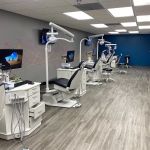How to Handle Dental Fear and Anxiety During Appointments
- Understanding Dental Anxiety
- Common Causes of Dental Fear
- Effective Strategies for Managing Dental Fear
- The Role of Dentists in Easing Anxiety
- Personal Stories and Real-Life Experiences with Dental Anxiety
- When to Seek Professional Help for Dental Anxiety
Understanding Dental Anxiety
Dental fear and anxiety are common concerns that many people experience when faced with a dental appointment. Whether it’s the sound of the dental drill, the fear of pain, or the feeling of being vulnerable in the dentist’s chair, these feelings can prevent individuals from seeking necessary dental care. Understanding that dental anxiety is a legitimate issue is the first step in overcoming it.
Dental anxiety affects people of all ages and can vary from mild unease to full-blown panic. For some, the thought of sitting in a dental chair is enough to cause physical symptoms like sweating, a racing heart, or even nausea. These reactions can make it difficult for patients to follow through with their appointments, which may lead to further dental issues down the road.
Fortunately, it’s possible to manage dental anxiety through several strategies and techniques. In this article, we’ll explore some of the most effective ways to overcome dental fear, share personal stories, and discuss how dentists can help patients feel more comfortable during their appointments.
Common Causes of Dental Fear
Dental anxiety can stem from a variety of sources. Understanding the root causes can help patients and dental professionals address these concerns more effectively.
Previous Negative Experiences
One of the most common reasons people develop dental anxiety is due to a negative past experience. This might include painful procedures, poor communication with a dentist, or feeling helpless during a previous appointment. These memories can create lasting fear, making it difficult to return to the dentist without feelings of dread.
Fear of Pain
For many, the fear of pain is the primary cause of dental anxiety. Even with modern advancements in pain management, the fear of discomfort during procedures like root canals, fillings, or extractions can be overwhelming. However, it’s important to remember that today’s dental treatments are designed to minimize pain and discomfort as much as possible, with options like local anesthesia and sedation available for nervous patients.
Embarrassment and Shame
For some individuals, dental anxiety is tied to feelings of embarrassment or shame about the state of their teeth. They may avoid dental appointments because they fear judgment or criticism from their dentist. This can create a vicious cycle of neglect and worsening dental issues. It’s important to find a supportive, understanding dentist who will help you feel comfortable and not judged.
General Anxiety and Phobias
Some people experience dental anxiety due to a more generalized sense of anxiety or phobias. For example, individuals who have social anxiety or specific phobias like claustrophobia might feel heightened stress in a confined dental chair. These patients may need extra support, such as relaxation techniques or sedation, to feel at ease during their appointment.
Effective Strategies for Managing Dental Fear
Overcoming dental fear is a process, but there are several strategies that can help make dental appointments more manageable.
Practice Relaxation Techniques
Before and during your appointment, practicing deep breathing exercises, meditation, or visualization can help calm your mind and body. Focus on slow, deep breaths to relax your nervous system, and try to visualize yourself in a peaceful setting, like a beach or a quiet forest. These techniques can reduce the feeling of panic and make it easier to cope with your anxiety.
Communicate with Your Dentist
Communication is key when dealing with dental anxiety. Let your dentist know about your concerns before your appointment so that they can take steps to make you feel more comfortable. Whether it’s explaining each step of the procedure beforehand or offering breaks during the appointment, a compassionate dentist will work with you to minimize discomfort and anxiety.
Bring a Supportive Friend or Family Member
If you’re feeling particularly nervous, consider bringing a supportive friend or family member with you to your appointment. Their presence can provide reassurance and help you feel more relaxed. Some people even find it helpful to bring music or an audiobook to listen to during the appointment as a distraction.
Consider Sedation Dentistry
If your dental anxiety is severe, sedation dentistry may be an option. Sedation helps to calm patients during procedures and can range from mild sedatives like nitrous oxide (laughing gas) to more profound sedation options like oral or IV sedation. Discuss your options with your dentist to determine what will be most effective for you.
The Role of Dentists in Easing Anxiety
Dentists play a crucial role in helping patients manage their dental anxiety. The most effective dentists are those who understand the emotional aspects of dentistry and take proactive steps to make patients feel more comfortable.
Creating a Comfortable Environment
One of the most important ways that a dentist can help reduce anxiety is by creating a comfortable and calming environment. Many dental offices are now equipped with soothing décor, relaxing music, and even aromatherapy to make patients feel at ease. Some dentists may also offer techniques like gentle touches, slower procedures, or clear explanations to keep patients informed and calm.
Offering a No-Judgment Zone
A compassionate dentist will never judge you for your fear or the state of your teeth. They understand that dental anxiety is common, and they will do their best to ensure that you feel supported throughout the process. If you feel embarrassed or ashamed, don’t hesitate to express this to your dentist so they can help address these concerns.
Personal Stories and Real-Life Experiences with Dental Anxiety
Many people who suffer from dental anxiety have shared their stories of overcoming their fears. For instance, Sarah, a 32-year-old patient, had avoided the dentist for years due to past traumatic experiences with dental work. After finding a compassionate dentist who used sedation options and allowed breaks during the procedures, she was able to manage her anxiety and return for regular checkups.
Another patient, James, found that practicing relaxation techniques before his appointments helped him reduce his anxiety. He also shared that bringing a friend for support during his appointments made the process much less intimidating. His experiences show that with the right strategies and support, overcoming dental fear is possible.
When to Seek Professional Help for Dental Anxiety
If dental anxiety is significantly affecting your ability to attend dental appointments, it may be helpful to seek professional help. A therapist or counselor who specializes in anxiety can help you work through your fears and teach you effective coping mechanisms. Cognitive-behavioral therapy (CBT) and exposure therapy are two effective treatments for managing dental anxiety.
Additionally, dentists who specialize in treating anxious patients can help you feel more comfortable during your appointments. These professionals often provide tailored sedation options and employ techniques that cater to patients with extreme dental anxiety.







 Fifth Avenue Dental4.0 (750 review)
Fifth Avenue Dental4.0 (750 review) Chapman Family Dentistry5.0 (196 review)
Chapman Family Dentistry5.0 (196 review) Family Dentistry Naples4.0 (98 review)
Family Dentistry Naples4.0 (98 review) Piscataway Family Dental3.0 (518 review)
Piscataway Family Dental3.0 (518 review) Smiles Divine Dental4.0 (25 review)
Smiles Divine Dental4.0 (25 review) Kids and Teen Dental Place4.0 (523 review)
Kids and Teen Dental Place4.0 (523 review) The Importance of Oral Health Education During Pregnancy for a Healthy Pregnancy
The Importance of Oral Health Education During Pregnancy for a Healthy Pregnancy Best Tips for Brushing Your Teeth Properly for Healthy Gums: Essential Techniques for Oral Health
Best Tips for Brushing Your Teeth Properly for Healthy Gums: Essential Techniques for Oral Health Why Skipping Dental Checkups Can Lead to Bigger Oral Health Problems
Why Skipping Dental Checkups Can Lead to Bigger Oral Health Problems Advantages of Porcelain Dental Restorations
Advantages of Porcelain Dental Restorations How Can Diabetes Cause Tooth and Gum Problems? Preventing and Managing Oral Health Issues
How Can Diabetes Cause Tooth and Gum Problems? Preventing and Managing Oral Health Issues Healthy Habits for Promoting Good Oral Health and Hygiene: Tips for a Healthy Smile
Healthy Habits for Promoting Good Oral Health and Hygiene: Tips for a Healthy Smile